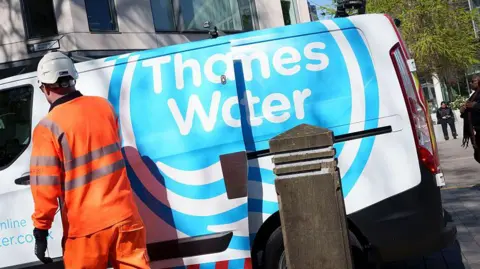Business Reporter
 Getty Images
Getty ImagesThames Water and other water companies could be prevented by the industry regulator from paying any bonuses, under rules due to come into effect next month.
Environment Secretary Steve Reed said new measures would stop water companies dumping a “tidal wave of sewage into our rivers while pocketing millions of pounds of bonuses”.
Regulator Ofwat has been able to stop firms using customer money to fund bonuses, but the new rules mean they could not use funds from shareholders or lenders either.
However, in a statement Thames, which recently agreed a £3bn rescue loan, said it was not paying performance-related bonuses but instead “retention payments”, which were not covered by the new rules.
Thames Water is the UK’s biggest water company, serving about a quarter of the UK’s population, but has come under fire in recent years.
It has huge debts and is struggling to fix leaks, sewage spills and modernise outdated infrastructure.
The company has estimated it could be fined up to £900m over the next five years for leaks and sewage spills.
Earlier this year, it secured £3bn in emergency funding, which it said would give it the space needed to complete a restructuring of its debts and attract a cash buyer.
Subsequently it picked US private equity giant KKR as its “preferred partner” to buy the firm.
Under its new powers contained in the the Water (Special Measures) Act, Ofwat will be able to ban “undeserved bonuses when high standards on the environment and financial management of water companies are not met”.
It could mean that Thames Water’s bonuses could be blocked as soon as next month.
The ban would also be retrospective, meaning bonuses paid in the last financial year could be clawed back.
The Department for Environment, Food and Rural Affairs (Defra) said customers “should not pay the price for water company mismanagement” and that it was “demanding an improvement in performance”.
It said firms would be judged each year on four measures – environmental performance, consumer matters, financial resilience and criminal liability.
Bonuses would be “prohibited if [the water companies] fail to meet acceptable standards”.
“The government will ban the payment of unfair bonuses for polluting water bosses,” Reed said. “The days of profiting from failure are over.”
Earlier this week, Thames chairman Sir Adrian Montague told MPs that hundreds of thousands of pounds worth of recent bonuses for bosses had been justified.
“We live in a competitive marketplace and we have to provide the right sort of packages to these people otherwise the head hunters come knocking,” he said.
Sir Adrian said top executives could get millions of pounds in bonuses as part of the emergency loan agreement.
In a statement, a Thames spokesperson said the company was involved in a “complex turnaround and restructuring process” to “deliver better results for our customers and the environment and seek a long-term solution to our financial resilience”.
“It is critical that the business retains the people best placed to deliver the improved outcomes our stakeholders rightly expect.”
Thames said the payments were not performance-related bonuses covered by the new rules, but instead “retention payments”.
It said none of these retention payments would be be funded by customers.
Last November, Ofwat blocked three water firms – including Thames, Yorkshire Water and Dwr Cymru Welsh Water – from using customer money to fund a total of £1.6m in bosses’ bonuses.
It said that by stopping customers from “paying for undeserved bonuses”, it was looking “to sharpen executive mindsets” and to push firms to improve their cultures of performance and accountability.


